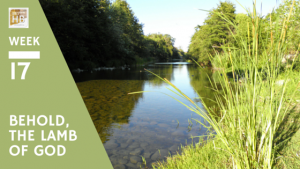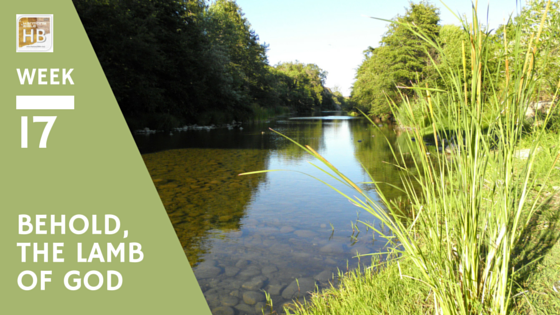Week 17 | Section 26, 27
 Word of John the Baptist’s ministry reached Jerusalem and concerned enough of the Jews there that they sent the a cadre of priests and scholars to investigate. Was he Elijah? The Prophet? or the Messiah? Why was John baptizing folks? In humility, John replied, I am “a voice” and I my role is to “make straight the way of the Lord”. These were familiar words to such learned Jews that should have resounded as good news, but perhaps it was their self-interest for personal significance that prevented them from responding to the good news. Let those who have ears to hear, hear what the spirit has to say.
Word of John the Baptist’s ministry reached Jerusalem and concerned enough of the Jews there that they sent the a cadre of priests and scholars to investigate. Was he Elijah? The Prophet? or the Messiah? Why was John baptizing folks? In humility, John replied, I am “a voice” and I my role is to “make straight the way of the Lord”. These were familiar words to such learned Jews that should have resounded as good news, but perhaps it was their self-interest for personal significance that prevented them from responding to the good news. Let those who have ears to hear, hear what the spirit has to say.
Scripture:
Section 26
John 1:19-28
19 This is John’s1¯2 testimony, when the Jews sent priests and Levites from Jerusalem3¯4 to ask him, “Who are you?”¯5 20 He declared, and didn’t deny, but he declared, “I am not the Christ.”6 21 They asked him, “What then? Are you Elijah?”7 He said, “I am not.” “Are you the prophet?”8 He answered, “No.” 22 They said therefore to him, “Who are you? Give us an answer to take back to those who sent us. What do you say about yourself?” 23 He said, “I am the voice of one crying in the wilderness,9 ‘Make straight the way of the Lord,’ as Isaiah the prophet said.” 24 The ones who had been sent were from the Pharisees. 25 They asked him, “Why then do you baptize, if you are not the Christ, nor Elijah, nor the prophet?” 26 John answered them, “I baptize in water,10 but among you stands one whom you don’t know.11 27 He is the one12 who comes after me, who is preferred before me, whose sandal strap I’m not worthy to loosen.” 28 These things were done in Bethany beyond the Jordan, where John was baptizing.13
Section 27
John 1:29-34
29 The next day, he saw Jesus coming to him, and said, “Behold,the Lamb of God,14¯15 who takes away the sin of the world! 30 This is he of whom I said, ‘After me comes a man who is preferred before me, for he was before me.’16 31 I didn’t know him,17 but for this reason I came baptizing in water: that he would be revealed to Israel.” 32 John testified, saying, “I have seen the Spirit descending like a dove out of heaven, and it remained on him. 33 I didn’t recognize him, but he18 who sent me to baptize in water, he said to me, ‘On whomever you will see the Spirit descending and remaining on him is he who baptizes in the Holy Spirit.’ 34 I have seen, and have testified that this is the Son of God.”19
Group Dialog:
- What anxieties have upset your life? Were they God-sent or spawn in fear, doubt, and uncertainty?
- What is your vocation in ministry?
- What experiences do you have of receiving foreknowledge?
- How do you discern the will of God, and the activity of God in your life?
- How does one go about testing to know whether what is begin preached is accurate, true, honoring God, and faithful to the Scriptures?
- What are the names of Jesus which offer you most comfort, courage and confidence?
Learning Objectives:
vocation, humility, commitment, disciple, servant-leadership, service, Messiah, prophesy, discernment, spiritual gifts, christian community, God’s perfect timing, responsibility of spiritual leaders
Study Notes:
- That is this “testimony” is of John the Baptist, the cousin of Jesus and son of Elizabeth & Zechariah (sec 4, 8a,b,c). John the Baptist was called to the ministry soon after conception. He would be the forerunner who had bee prophesied about in the OT.
- John the brother of James is the author of this book. He is the one who is the disciple of Jesus.
- John is charging people to repent and wait for the Messiah. Something which the priests would also be doing. However the role of the local elders would to have been to discern if what John the Baptist was saying was true or not. Because thousands had been gathering to hear and respond to John’s message, it might have also stirred some jealousy among the local elders, and priests who then asked that the Sanhedrin. The great Sanhedrin was the body of priests charged to settle matters that required discernment and arbitration. A false prophet was to be put to death (Deuteronomy 18:20) only after a the vote of the counsel of seventy-one. The council of seventy-one were the supreme court and legislative body in Judea during the Roman period. It continued to function for more than four hundred years after the destruction of the Temple.
- The Jordan was a day’s journey (about 26 miles) from Jerusalem. The Sanhedrin did not, and could not, originate charges, but they investigated people/situations that were brought before it by others. So it is likely that certain members of the Sanhedrin went and then reported the matter to the seventy-one.
- The time for the fulfillment of Daniel’s prophecy was imminent. The priests, Levites and pharisees investigating is a responsible action and response to the rising of John’s message and activity of baptizing folks with water. Yet they also seem to be filled with some anticipation, skepticism, sincerity, and self-interest (to protect their position and role). The season of the Old Covenant is about to end.
- I am not the Messiah (in Hebrew). So they continue their investigation.
- Malachi 4:4-5 the Jews expected that the Elijah would come in person a little before the coming of the Messiah. The tradition of the Jews was to set a place setting and chair for Elijah at the Passover meal every year as a symbol to remind the Jews that “there is one who is to come” (Messiah).
- That is “Jeremiah”, whom some Jews thought Moses said would appear before the emergence of the Messiah (Deuteronomy 18:15).
- He is saying he is the prophetic fulfillment spoken of by Isaiah (Isa 40:3). I am the forerunner, the herald.
- Water will purify, cleanse, a symbol of repentance familiar to the Jews.
- Jesus had not yet become a public figure. He was unknown to the Sanhedrin.
- The promised Messiah. The coming of the Messiah would mark the end of a covenant and a significant change in the status quot of the ministry of priests. They had also hoped that the Messiah would come and deliver the Jews from the current oppressor, the Romans. But Jesus will not be known to be a king of war, nor one who would bring prosperity.
- See the maps on this page.
- Historically the Jews would have understood this to be the pascal lamb in remembrance of their deliverance from the angel of death in Exodus. Jesus however, would become the eternal sacrifice, the propitiation of our sins – not only for Israel but for the sin of the whole world.
- These two articles have more information about Jesus, being The Passover Lamb (article 1, article 2)
- We see the humility of John. As John the Baptist was about six months older than Jesus, we also understand in this passage John’s understanding that Jesus existed in eternity, that is the divinity of Jesus (John 1:1-2).
- This doesn’t seem to be doubt or his lack of awareness as in the passage above John told the Sanhedrin that the Messiah was here. Prior to that He himself leaped in his mother’s womb, and at the Baptism he recognized Jesus to be the Messiah, and the dove was a sign of such (vs 33). So in one way John was experiencing an ongoing revelation of God’s plan and a deeper knowing of Jesus’ identity and purpose.
- GOD
- Names of Jesus: son of God, Christ, the Lord, the Lamb of God. Remember again the words of the Father at the time of Jesus baptism, (Sec 23 – Mt 3:17; Mk 1:11; Lk 3:22).
